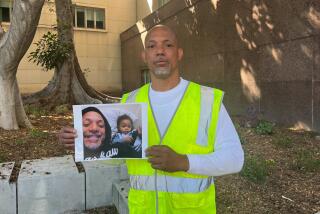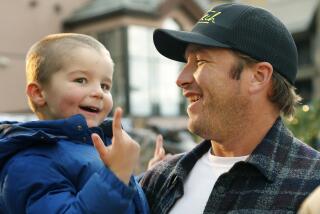Julie Bowen talks about allergies in her own ‘Modern Family’
- Share via
Actress Julie Bowen of “Modern Family” doesn’t want other parents to go through what she and her husband did when their toddler experienced a life-threatening allergic reaction that sent him into anaphylactic shock.
Her son recovered completely, but the incident inspired Bowen to become an activist in educating the public about kids’ allergies. Here, she talks about how parents can prepare themselves for the possibility of such an incident and what she’s done to keep her family safe.
FOR THE RECORD:
Julie Bowen: An article about childhood allergies in the Dec. 1 Saturday section incorrectly quoted “Modern Family” actress Julie Bowen as saying her son was “treated with an EpiPen” in an emergency room. She actually said the boy was treated with epinephrine. Also, the article incorrectly said that 1 in 4 children has a food allergy; about 1 in 13 does. —
Tell me about what happened to your son.
When my oldest son was just shy of 2 years old, he was eating peanut butter and he was stung by a bee simultaneously. We’re not exactly sure what the trigger was, but he went into anaphylactic shock. His entire face swelled up, his eye swelled shut and his lips became giant. My husband sent me a picture of it, and I immediately panicked.
We took him to the ER, where he was treated with an EpiPen, and ever since then we’ve been vigilant about keeping him safe.
What was it like for you as a parent to see your son go through that?
It was so scary. At first I actually thought it couldn’t be an allergic reaction; there was some small amount of denial kicking in. He had eaten peanut butter before, and I just didn’t want it to be true. I thought, “No, no, it must be something else.”
I don’t want other families to go through that. I think that if I recognized how serious this was, I would have learned more about it and the denial wouldn’t have kicked in at all. For that reason, I want other parents to know what to look for. Our son’s reaction to his allergy was very dramatic, but I’ve been over at a friend’s house and she was having nuts and her child had a slight reaction that my friend ignored.
There’s this wave of kids who have food allergies. It’s a big deal; it’s a reality.
You have two other sons. What has their reaction been to this, and how has your parenting changed with them since your son’s allergic reaction?
They know what the auto-injector is and they have seen us practice with it, although I hope they would never have to use it. We want all of them to live healthy, normal, active lives.
So far my other kids haven’t had any allergic reactions, and they’ve been introduced to all the same foods. We’re careful when we introduce a new food — especially something like shellfish, which a lot of people are allergic to — so when we introduced shrimp to all the kids, we didn’t do it when we were on a tropical island far away from medical care.
What do parents need to know?
Parents need to get familiar with the signs and symptoms of anaphylaxis, to be vigilant and aware and know the triggers.
With my son, any time there’s a new food that he’s not familiar with, he’ll ask if there are nuts in it. Kids are surprisingly able to understand the issue and be part of the solution. He’s young, but he’s very aware of it and doesn’t think it makes him weird or strange, because it doesn’t.
One in four kids has a food allergy that can turn into anaphylaxis, so it’s not unusual in most schools. But there’s a whole list of things that can be triggers, from bees to nuts to even latex, and people don’t know about a lot of them.
How did you learn the proper way to deal with it?
It’s pretty straightforward. I don’t need to know everything that happens during an anaphylactic reaction; it’s enough for me to know as a parent that it can kill you. Your tongue swells, and breathing is hard. We treat ours with an EpiPen auto-injector, and my son’s school has one. If he has a play date, it goes in a backpack with him.






